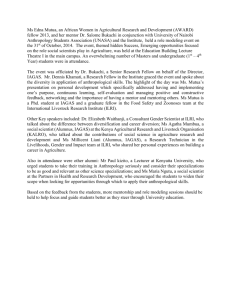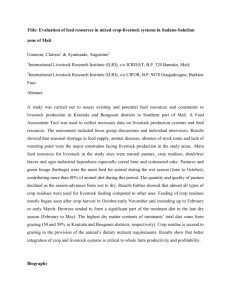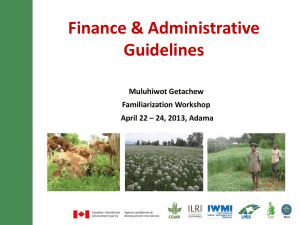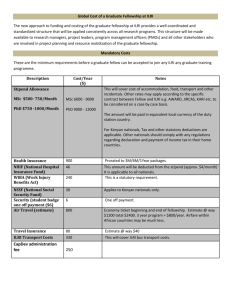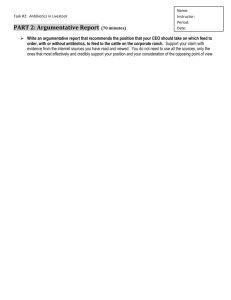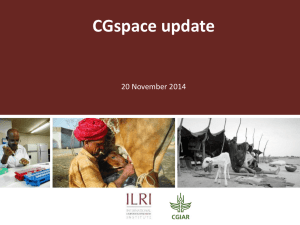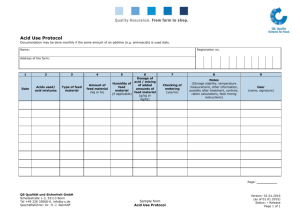Feed aggregator | International Livestock Research Institute
advertisement
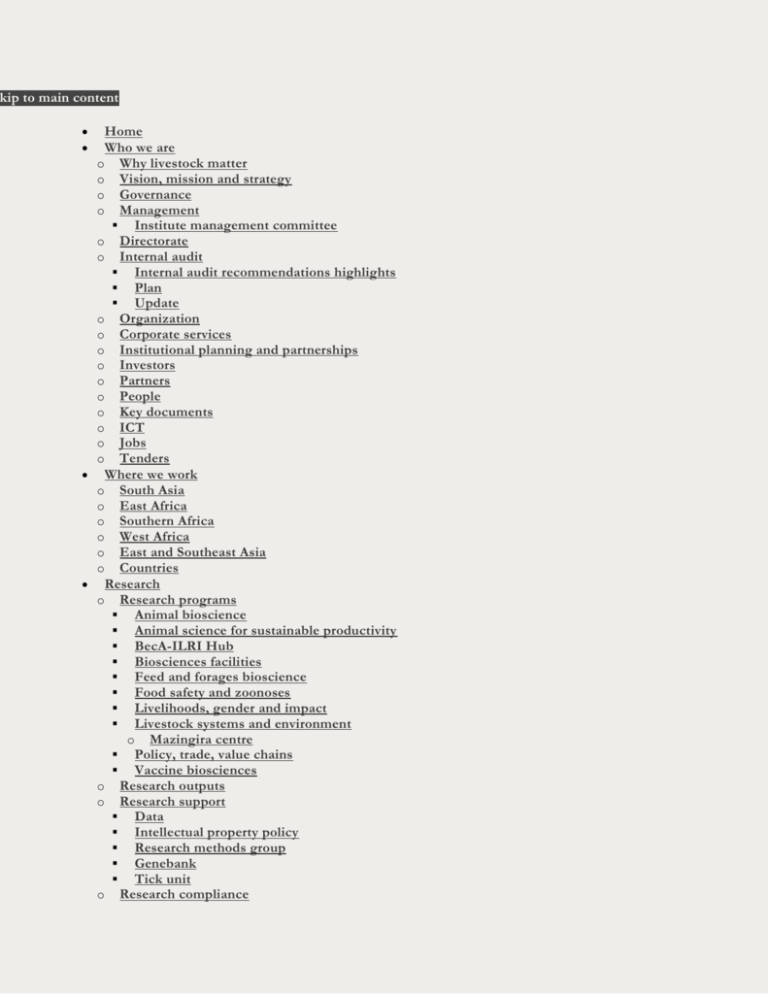
kip to main content Home Who we are o Why livestock matter o Vision, mission and strategy o Governance o Management Institute management committee o Directorate o Internal audit Internal audit recommendations highlights Plan Update o Organization o Corporate services o Institutional planning and partnerships o Investors o Partners o People o Key documents o ICT o Jobs o Tenders Where we work o South Asia o East Africa o Southern Africa o West Africa o East and Southeast Asia o Countries Research o Research programs Animal bioscience Animal science for sustainable productivity BecA-ILRI Hub Biosciences facilities Feed and forages bioscience Food safety and zoonoses Livelihoods, gender and impact Livestock systems and environment o Mazingira centre Policy, trade, value chains Vaccine biosciences o Research outputs o Research support Data Intellectual property policy Research methods group Genebank Tick unit o Research compliance Animal care and use committee Biosafety committee Research ethics committee o Health and safety o Genebank o Technical consortium for building resilience o ILRI in CGIAR research programs Agriculture for nutrition and health Climate change, agriculture and food security Dryland systems Humidtropics Livestock and fish Managing and sustaining crop collections Policies, Institutions, and markets Water, land and ecosystems o Data o Open access Communications o Knowledge o Publications o Events o Media News Films Photos Audio Newsfeeds Info tools and resources Events calendar o News o RSS feeds o Research outputs repository o Info tools and resources o Acronyms o Publishing o ICT o Data o Open access o Social Capacity development Jobs Contact us login International Livestock Research Institute You are here Home » Feed aggregator Feed aggregator Improved small ruminant value chains in Ethiopia focus of new Livestock and Fish project ILRI blogposts front page - May/2015 2015/05 - CGIAR Research Program on Livestock and Fish Improved small ruminant value chains in Ethiopia focus of new Livestock and Fish project ILRI Blogposts - May/2015 2015/05 - CGIAR Research Program on Livestock and Fish Improved small ruminant value chains in Ethiopia focus of new Livestock and Fish project Ethiopia Bookmarks - May/2015 2015/05 - CGIAR Research Program on Livestock and Fish Improved small ruminant value chains in Ethiopia focus of new Livestock and Fish project Goats Bookmarks - May/2015 2015/05 - CGIAR Research Program on Livestock and Fish Improved small ruminant value chains in Ethiopia focus of new Livestock and Fish project CRP 3.7 News - May/2015 Smallholder family with sheep in Doyogena In April this year, the International Agricultural Research for Development agreed to co-finance a three year project to improve the performance of pro-poor sheep and goat value chains for enhanced livelihoods, food and nutrition security in Ethiopia. The project is led by the International Center for Agricultural Research in the Dry Areas (ICARDA) partnering with the International Livestock Research Institute (ILRI) and the Ethiopian Institute of Agricultural Research (EIAR). The project emerged from recent work by ICARDA and partners to identify the key opportunities to transform small ruminant value chains in the country. The project will improve livelihoods and assets, particularly of women, through increased incomes, reduced risk and improved market access in selected sheep and goat meat value chains. It will do this by testing appropriate approaches and strategies to increase herd productivity, producers’ income, and meat production. The four project components are: 1. Analysis of sheep and goat value chain performance, governance and institutional frameworks. 2. Design, implementation and evaluation of technology and institutional intervention and integrated intervention packages to improve value chain performance. 3. Facilitation of an enabling environment for value chain transformation and for upscaling interventions. 4. Design and implementation of data and knowledge management systems and a communi cation strategy to document and share evidence, outputs and lessons as a basis for upscaling . By the end of the three year period, the project will have produced the following outcomes: Sheep and goat value chain performance, governance and institutional frameworks in Ethiopia understood and policy-makers made aware of constraints for sectoral growth and of gaps in institutional support First set of interventions adopted by target producers, both women and men, and ready for up -scaling through a network of development partners developed by the project. Dissemination of evidence and lessons learned and feasibility study on the possibility of up -scaling the interventions. The project will be launched with partners on 8 June 2015. More information Barbara Rischkowsky, ICARDA, b.rischkowsky [AT] cgiar.org Updates from the program in Ethiopia Program updates on small ruminant value chain development Filed under: Africa, CRP37, East Africa, Ethiopia, Goats, ICARDA, Livestock, Sheep, Small Ruminants, Value Chains ILRI supports early career agricultural researchers through the CIRCLE fellowships program Africa Bookmarks - May/2015 2015/05 - ILRI Clippings ILRI supports early career agricultural researchers through the CIRCLE fellowships program ILRI Blogposts - May/2015 2015/05 - ILRI Clippings ILRI supports early career agricultural researchers through the CIRCLE fellowships program CRP 7 bookmarks - May/2015 2015/05 - ILRI Clippings ILRI supports early career agricultural researchers through the CIRCLE fellowships program ILRI blogposts front page - May/2015 2015/05 - ILRI Clippings Feed storage practices and aflatoxin contamination of dairy feeds in the Greater Addis Ababa milk shed, Ethiopia Our latest outputs - May/2015 Feed storage practices and aflatoxin contamination of dairy feeds in the Greater Addis Ababa milk shed, Ethiopia Gizachew, D.; Szonyi, B.; Tegegne, A.; Hanson, J.; Grace, D. Aflatoxin B1 (AFB1) is a highly toxic metabolite of Aspergillus fungi that contaminates animal feed. A cross-sectional study was conducted at the International Livestock Research Institute (ILRI) in the Greater Addis Ababa milk shed between September 2014 and February 2015. The objectives were to assess the knowledge and practices of dairy value chain actors on aflatoxins, and to analyze feed for the presence of AFB1. A structured questionnaire was administered to value chain actors. A total of 100 dairy farmers, five feed manufacturers, five feed processors and nine feed traders were interviewed and feed samples were collected. All dairy farmers used concentrate feed daily, which commonly included the mixture of wheat bran and noug (Guizotia abyssinica) cake (the byproduct from noug oil factory). In general, feed was stored indoors (94%) in plastic bags. Quality assessment of feed ingredients was limited to visual inspection. Storage time was highly variable and sometimes up to six months long. Preventive measures, such as the practice of keeping feed on raised platforms were not common (15%). Most respondents never heard of aflatoxins (88%). Over 90% of dairy farmers had no knowledge that milk could be contaminated with aflatoxin. We analyzed the level of AFB1 in 114 feed samples from dairy farmers and 42 feed samples from feed producers and processors using enzyme linked immunosorbent assa y (ELISA). All the feed samples were contaminated with AFB1 ranging between seven and 419 ppb (ug/kg). Analysis of individual wheat bran and noug cake samples revealed that the contamination level of AFB1 for wheat bran was between nine and 31 ppb while the contamination level for noug cake was between 290 and 397 ppb. Linear regression revealed significant associations between the presence of noug cake in the feed and the levels of contamination of AFB1 in feed. The level of aflatoxin contamination found in feed is alarming and should prompt urgent action to identify suitable interventions. Training should be provided to the dairy sector on risk mitigation strategies. These results suggest that risk mitigation should focus on noug cake to effectively reduce aflatoxin contamination in the peri-urban dairy value chains in Ethiopia. Feed storage practices and aflatoxin contamination of dairy feeds in the Greater Addis Ababa milk shed, Ethiopia ILRI Market Opportunities Theme: Animal health and food safety for trade - May/2015 Feed storage practices and aflatoxin contamination of dairy feeds in the Greater Addis Ababa milk shed, Ethiopia Gizachew, D.; Szonyi, B.; Tegegne, A.; Hanson, J.; Grace, D. Aflatoxin B1 (AFB1) is a highly toxic metabolite of Aspergillus fungi that contaminates animal feed. A cross-sectional study was conducted at the International Livestock Research Institute (ILRI) in the Greater Addis Ababa milk shed between September 2014 and February 2015. The objectives were to assess the knowledge and practices of dairy value chain actors on aflatoxins, and to analyze feed for the presence of AFB1. A structured questionnaire was administered to value chain actors. A total of 100 dairy farmers, five feed manufacturers, five feed processors and nine feed traders were interviewed and feed samples were collected. All dairy farmers used concentrate feed daily, which commonly included the mixture of wheat bran and noug (Guizotia abyssinica) cake (the byproduct from noug oil factory). In general, feed was stored indoors (94%) in plastic bags. Quality assessment of feed ingredients was limited to visual inspection. Storage time was highly variable and sometimes up to six months long. Preventive measures, such as the practice of keeping feed on raised platforms were not common (15%). Most respondents never heard of aflatoxins (88%). Over 90% of dairy farmers had no knowledge that milk coul d be contaminated with aflatoxin. We analyzed the level of AFB1 in 114 feed samples from dairy farmers and 42 feed samples from feed producers and processors using enzyme linked immunosorbent assay (ELISA). All the feed samples were contaminated with AFB1 ranging between seven and 419 ppb (ug/kg). Analysis of individual wheat bran and noug cake samples revealed that the contamination level of AFB1 for wheat bran was between nine and 31 ppb while the contamination level for noug cake was between 290 and 397 ppb. Linear regression revealed significant associations between the presence of noug cake in the feed and the levels of contamination of AFB1 in feed. The level of aflatoxin contamination found in feed is alarming and should prompt urgent action to identify suitable interventions. Training should be provided to the dairy sector on risk mitigation strategies. These results suggest that risk mitigation should focus on noug cake to effectively reduce aflatoxin contamination in the peri-urban dairy value chains in Ethiopia. Friday morning coffee – Nairobi, 22 May 2015 Latest ILRI announcements - May/2015 ILRI Nairobi’s Friday morning coffee (FMC) announcements and updates from 22 May 2015. Listen in! ILRI Ethiopia: Health and Safety Helpdesk established Latest ILRI announcements - May/2015 You may have noticed this smiling face around campus… This is Ashenafi Kidanemariam, ILRI Ethiopia’s new environmental, occupational health and safety officer. He is a member of the People & Organizational Development team. Ashenafi has recently set up his office here in Addis next to the Engineering & Facilities Unit in the Ogaden building and shares this message below about what services he provides and how you can reach him. Gail Amare | Head of Administration, Ethiopia Mobile: +251 930-09-74-57 | Tel: +251 116-17-21-12 | Skype: name Gail.Amare For assistance, contact Abeba Zenebe |+251 11 617 2111| a.zenebe From: Kidanemariam, Ashenafi (ILRI) Sent: Monday, May 25, 2015 10:47 AM Subject: Health and safety help desk center Environment, occupational health and safety office It is our goal to take care of every question and concern that you may have about workplace safety, health and environment.Contact info: ILRI-Ethiopia EOHS helpdesk Email: ilriethiopiaeohs@cgiar.org Call Ashenafi Kidanemariam (EOHS officer) on +251-116-17-2230 or Ext : 2230 Emergency contact out of hours: +251 920-864-234 Please enter these numbers on your mobile phone & post it on your desk Please use the above contact info to: 1. Seek Health and safety information and guidance You can contact the health and safety office to seek any information or guidance on issues related to health and the work place environment. The EOHS office provides health counseling and health education on work place hazards (physical, chemical, biological, psychosocial, ergonomic hazards) and their control measures. 2. Register a complaint Complaints about food safety and kitchen hygiene: cleanliness and sanitation, poor employee hygiene practices, improperly cooked or handled food, food that tastes /smells bad, foreign material in the food, symptoms of food borne illness such as diarrhea, vomiting, nausea, fever and cramps, and any other complaints. Ergonomic complaints (back pain, wrist pain, eye problems etc.) or Any other health and safety complaints. 3. Report an incident/accident All accidents/incidents must be reported using ILRI’s accident reporting form. The completed form should be sent to the above address within 24 hours of the accident/incident. All incidents should be reported online at the given help desk email address or use the telephone service Ext: 2230 (open hours Monday to Friday 8:15 am to 5:00 pm). 4. Report pest incident – if you notice pest infestation in your office please let us know as soon as possible. 5. Raise a concern about workplace health and safety Raise any issue that has caused or has potential to cause significant harm for staff and the environment. Raise issues that constitute a significant breach of ILRI’s health and safety policy. 6. Report emergencies and seek help In the event of an emergency, it is best to call security at 2700 immediately (0116-17-2700 from mobile phones) as they are at their desk every day all day. Security will this ensure that the proper assistance is requested. While security will notify the EOHS officer, you may also call him as he can provide medical assistance until an ambulance arrives (extension 2230 or 0116-17-2230) The EOHS officer can Provide first aid. Provide emergency assistance in case of fire. Manage outbreaks. Request ambulance service in case of medical emergency (NB: You can also call directly to St.Yared General Hospital at +251-116-460-911 or +251-116-454-604) How to contact health and safety officer out of hours: If a major incident/accident happens outside of the working hours please notify security at 2700, and then call the health and safety officer +251 920-864-234 on his mobile. EOHS PHYSICAL LOCATION: The health and safety office is located next to the engineering and facilities office in the Ogaden building. We are happy to help! Ashenafi Kidanemariam | People and Organizational Development Email: A.kidanemariam@cgiar.org ILRI Kenya: Computer preventive maintenance coming to an end Latest ILRI announcements - May/2015 Kindly note that preventive maintenance exercise is coming to an end this week on May 29, 2015. In case your machine was not serviced, please send an email to the ICT helpdesk (ilrikehelpdesk@cgiar.org). ILRI| ICT Customer Services Tel: +254 20 422 3500/3253 Email: ILRIKEHelpdesk ILRI supports early career agricultural researchers through the CIRCLE fellowships program Clippings - May/2015 By Joyce Maru The Climate Impact Research Capacity and Leadership Enhancement in Sub-Saharan Africa (CIRCLE) program is an initiative of the UK’s Department for International Development (DFID) that is developing the skills and research output of early career researchers in Africa in the field of climate change. Started in 2014, the program runs until 2018 and is managed and implemented by the Association of Commonwealth Universities (ACU) and the African Academy of Sciences (AAS). How ILRI participates in CIRCLE The International Livestock Research Institute (ILRI) is a partner in the program and is both a ‘ho st’ and a ‘home’ institute for CIRCLE, which is integrated into ILRI’s graduate fellowship program. At ILRI, the program is coordinated by the Capacity Development Unit and supported by the Livestock Systems and Environment (LSE) program and the CGIAR Research Program on Climate Change, Agriculture and Food Security (CCAFS). In 2015, ILRI, through the LSE program is hosting Abraham Belay, an MSc Fellow from Ethiopia’s Hawassa University’s Wondo Genet College of Forestry and Natural Resources who is supervis ed by John Recha of CCAFS. As part of the partnership with CIRCLE, the CCAFS program nominated Catherine Mungai, an emerging young scientist with the program, to study climate change and adaptation at the University of Nairobi for one year after which she will resume her employment at ILRI. ILRI will host more fellows for the duration of the program and nominate other interested emerging researchers undertaking research in climate change. Why a focus on climate change in agriculture? With about 70% of Africa’s population depending on agriculture and 40% of the continents total exports being agriculture-based, the impact of climate change on agriculture is a major concern and there’s urgency to focus and address the issues through research. Agriculture related research themes under the CIRCLE remit include: Impact of changing precipitation on agricultural production Development of new and climate-resistant crops Climate-smart agricultural practices Opportunities in new climate regimes Why focus on early/emerging career researchers? The aim of the program is not simply to produce a body of research, but to strengthen mechanisms for better research uptake and to support institutions develop and realize a holistic and more (developmental) strategic approach to climate change research. On their own, the fellowships will have important but limited benefits but by concurrently strengthening the capacity of organizations and institutions to manage, organize and support the career development of ‘next generation’ researchers, it is foreseen that fellows will return to organizations with a more enabling and sustainable environment for further research. This program is nurturing early career academics for the long-term future development of research, while also offsetting some of the common disadvantages they face in obtaining funding and time for scientific enquiry. Catherine Mungai Catherine Mungai (c) (photo credit: S Kilungu/CCAFS). Host institute: Institute for Climate Change and Adaptation, University of Nairobi, Kenya. Area of research: Climate change, food security, gender, policy She says one of the unique features of the CIRCLE program is its mentoring and supervision structure which enables fellows to benefit from knowledge and experience from a wide range of researchers in different institutions. ‘In my case, I have a mentor from ILRI, two supervisors from University of Nairobi and an advisor from the University of Greenwich. I look forward to drawing a lot of inspiration and enriching my research experience by interacting with the entire team.’ Joyce Maru is a capacity development officer at ILRI. Filed under: Africa, Agriculture, Article, Capacity Strengthening, CapDev, Climate Change, LSE, Research Tagged: Catherine Mungai, CCAFS, CIRCLE ILRI supports early career agricultural researchers through the CIRCLE fellowships program Africa Clippings - May/2015 By Joyce Maru The Climate Impact Research Capacity and Leadership Enhancement in Sub-Saharan Africa (CIRCLE) program is an initiative of the UK’s Department for International Development (DFID) that is developing the skills and research output of early career researchers in Africa in the field of climate change. Started in 2014, the program runs until 2018 and is managed and implemented by the Association of Commonwealth Universities (ACU) and the African Academy of Sciences (AAS). How ILRI participates in CIRCLE The International Livestock Research Institute (ILRI) is a partner in the program and is both a ‘host’ and a ‘home’ institute for CIRCLE, which is integrated into ILRI’s graduate fellowship program. At ILRI, the program is coordinated by the Capacity Development Unit and supported by the Livestock Systems and Environment (LSE) program and the CGIAR Research Program on Climate Change, Agriculture and Food Security (CCAFS). In 2015, ILRI, through the LSE program is hosting Abraham Belay, an MSc Fellow from Ethiopia’s Hawassa University’s Wondo Genet College of Forestry and Natural Resources who is supervised by John Recha of CCAFS. As part of the partnership with CIRCLE, the CCAFS program nominated Catherine Mungai, an emerging young scientist with the program, to study climate change and adaptation at the University of Nairobi for one year after which she will resume her employment at ILRI. ILRI will host more fellows for the duration of the program and nominate other interested emerging researchers undertaking research in climate change. Why a focus on climate change in agriculture? With about 70% of Africa’s population depending on agriculture and 40% of the continents total exports being agriculture-based, the impact of climate change on agriculture is a major concern and there’s urgency to focus and address the issues through research. Agriculture related research themes under the CIRCLE remit include: Impact of changing precipitation on agricultural production Development of new and climate-resistant crops Climate-smart agricultural practices Opportunities in new climate regimes Why focus on early/emerging career researchers? The aim of the program is not simply to produce a body of research, but to strengthen mechanisms for better research uptake and to support institutions develop and realize a holistic and more (developmental) strategic approach to climate change research. On their own, the fellowships will have important but limited benefits but by concurrently strengthening the capacity of organizations and institutions to manage, organize and support the career development of ‘next generation’ researchers, it is foreseen that fellows will return to organizations with a more enabling and sustainable environment for further research. This program is nurturing early career academics for the long-term future development of research, while also offsetting some of the common disadvantages they face in obtaining funding and time for scientific enquiry. Catherine Mungai Catherine Mungai (photo credit: S Kilungu/CCAFS). Host institute: Institute for Climate Change and Adaptation, University of Nairobi, Kenya. Area of research: Climate change, food security, gender, policy She says one of the unique features of the CIRCLE program is its mentoring and supervision structure which enables fellows to benefit from knowledge and experience from a wide range of researchers in different institutions. ‘In my case, I have a mentor from ILRI, two supervisors from University of Nairobi and an advisor from the University of Greenwich. I look forward to drawing a lot of inspiration and enriching my research experience by interacting with the entire team.’ Joyce Maru is a capacity development officer at ILRI. Filed under: Africa, Agriculture, Article, Capacity Strengthening, CapDev, Climate Change, LSE, Research Tagged: Catherine Mungai, CCAFS, CIRCLE Locust-rich diet good for the heart Livestock news - May/2015 2015/05 - allAfrica.com Fresh milk, off the grid Food safety bookmarks - May/2015 2015/05 - EurekAlert! Science News Fresh milk, off the grid Livestock news - May/2015 2015/05 - EurekAlert! Science News Fresh milk, off the grid Dairying Bookmarks - May/2015 2015/05 - EurekAlert! Science News Pages « first ‹ previous … 207 208 209 210 211 212 213 214 215 … next › last » Share | ILRI is a member of the CGIAR Consortium Grab our RSS Feeds Follow us on Twitter "Like" us on Facebook Slideshare Presentations Videos on YouTube See photos on Flickr See photos on Pinterest Follow us on LinkedIn Contact us | Copyright and permissions | Search| Subscribe © International Livestock Research Institute (ILRI)
